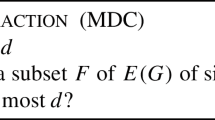Abstract
We analyze the exact numbers of iterations in three basic tree contraction algorithms. These numbers are bounded by c log2(n) + c′, for some constants c, c′. We show that the best constant coefficient at log2(n) for the two tree contraction algorithms given in [10, 11] is 1/log2φ, where φ is the golden ratio. φ ≈ 1.618 and 1/log2φ ≈ 1.44. For the rake-compress algorithm of Miller and Reif the best coefficient is shown to be 1/log2λ, where λ is a real solution of the equation λ3= λ + 1. λ ≈ 1.32 and 1/log2λ ≈ 2.46. Consequently, the algorithms from [10, 11] make about twice less iterations compared with the Miller and Reif algorithm. Although all three algorithms use similar operations their behaviours are different and they have to be analyzed separately. The proof of the lower bound for c is rather simple, however the proof of the upper bound (matching the lower bound) is more involved. It required a big number of computer experiments to guess some useful properties of the solutions of complicated recurrence equations (similar to dynamic programming recurrences). Several types of Fibonacci-like trees (Tk, T *k and Pk) play an important role in the analysis. A contraction of directed acyclic graphs is analyzed similarly as tree-contraction. We contribute here also to the combinatorics of trees.
Preview
Unable to display preview. Download preview PDF.
Similar content being viewed by others
Bibliography
Abrahamson K, Dadoun N, Kirckpatrick D, Przytycka T: A simple tree contraction algorithm, Journal of Algorithms
Brent R.P: The parallel evaluation of general arithmetic expressions. JACM 21,2 (1974), pp.201–2010
Cole R. Vishkin U: Accelerated centroid decomposition technique for optimal parallel tree evaluation in logarithmic time. Manuscript (1986)
Gibbons A. Rytter W: An optimal parallel algorithm for dynamic expression evaluation and its applications. Information and Computation (1989)
Gibbons A. Rytter W: Efficient parallel algorithms. Cambridge University Press, 1988
de Luca A: A combinatorial property of the Fibonacci words, IPL 12:4 (1981) 193–195
Mayr E: The dynamic tree expression problem, Technical report, Stanford University (1988)
Miller G. Reif J: Parallel tree contraction and its application. 26th IEEE Symp. on Found. of Computer Science (1985) pp.478–489
Miller G. Ramachandran V. Kaltofen E: Efficient parallel evaluation of straight line code and arithmetic circuits. Workshop om parallel algorithms, AWOC, Lect. Notes in Comp. Science (1986)
W.Rytter: The complexity of two-way pushdown automata and recursive programs, NATO Workshop "Combinatorial algorithms on words" (ed.A.Apostolico, Z.Galil), Springer-Verlag (1985)
W.Rytter: On parallel computations of expressions and straight line programs, Computers and Artificial Intelligence (1990)
Rytter W: On efficient parallel computations for some dynamic programming problems, TCS 59 (1988) 297–307
Valiant L, Skyum S, Berkowitz S, Rackoff C: Fast parallel computations of polynomials using few processors. SIAM J.Comp. 12,4 (1983) pp.641–644
Author information
Authors and Affiliations
Editor information
Rights and permissions
Copyright information
© 1991 Springer-Verlag Berlin Heidelberg
About this paper
Cite this paper
Plandowski, W., Rytter, W., Szymacha, T. (1991). Exact analysis of three tree contraction algorithms. In: Budach, L. (eds) Fundamentals of Computation Theory. FCT 1991. Lecture Notes in Computer Science, vol 529. Springer, Berlin, Heidelberg. https://doi.org/10.1007/3-540-54458-5_81
Download citation
DOI: https://doi.org/10.1007/3-540-54458-5_81
Published:
Publisher Name: Springer, Berlin, Heidelberg
Print ISBN: 978-3-540-54458-6
Online ISBN: 978-3-540-38391-8
eBook Packages: Springer Book Archive




